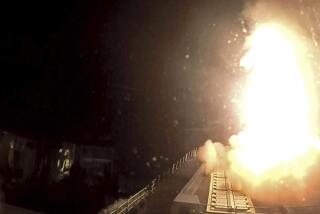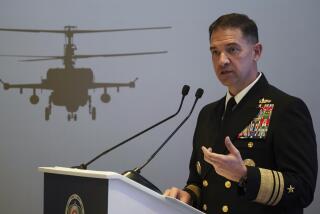Gulf Leaders Ask U.N. for Iran Sanctions
- Share via
CAIRO — The leaders of six Arab states in the Persian Gulf region appealed Tuesday to the U.N. Security Council to impose sanctions on Iran for its refusal to accept a cease-fire in the seven-year-old Iran-Iraq War.
Speaking at the close of a summit meeting of the Gulf Cooperation Council, the Saudi Arabian foreign minister, Prince Saud al Faisal, also told reporters in the Saudi capital of Riyadh that the council members will welcome proposals to create an international naval force to protect civilian shipping in the gulf.
He said the six gulf states will send envoys to the capitals of the five permanent members of the Security Council to urge them to take measures to enforce Resolution 598, the U.N. body’s July 29 cease-fire order, by imposing “sanctions on the state that does not accept it”--an obvious reference to Iran.
The four-day summit meeting, called to draft diplomatic and military strategies to protect member states from the widening war, began with a bang and appeared to have ended with one.
Column of Smoke
Iranian gunboats attacked and severely damaged a Saudi oil tanker on the eve of the meeting and, as the summit drew to a close, residents in Kuwait reported heavy shelling and a thick column of smoke rising over Bubiyan Island, a Kuwaiti military zone less than five miles from Iranian positions on Iraq’s Faw Peninsula.
Diplomats in Kuwait speculated that Iran may have fired one of its Chinese Silkworm missiles at the island to dramatize its displeasure with the gulf summit. There have been at least seven Silkworm missile attacks on Kuwaiti coastal and offshore oil installations this year from Iranian missile positions on the Faw Peninsula.
Shipping officials in Dubai, at the southern end of the gulf, reported that Iranian gunboats seized a West German container ship carrying general merchandise, the 31,000-ton Norasia Pearl, early Tuesday and diverted it to the nearby Iranian port of Bandar Abbas for inspection. Iranian gunboats frequently intercept ships entering the gulf to see if they are carrying war materiel for Iraq.
And Baghdad radio reported that Iraq dealt an “accurate, effective blow” Tuesday against a large maritime target--the usual term for a tanker--off the Iranian coast.
The final statement adopted at Riyadh by the six gulf council members--Saudi Arabia, Kuwait, Bahrain, Qatar, Oman and the United Arab Emirates--calls on the U.N. Security Council “to shoulder its responsibility in adopting the measures to implement Resolution 598,” which provides for sanctions in the event of non-compliance.
Iraq has accepted the resolution, but Iran has indicated it would agree to a cease-fire only if Iraq were condemned as the aggressor in the conflict and forced to pay what would likely amount to billions of dollars in reparations.
The Reagan Administration wants the Security Council to impose a mandatory arms embargo on Iran, but it has been blocked by the Soviet Union, which wants to replace the U.S. naval force in the gulf with an international force flying the U.N. flag.
The State Department, after repeatedly rejecting the Soviet proposal, said Monday that it might reconsider the idea.
International Force
In what appeared to be an effort to move the superpowers closer to an agreement, Prince Saud said the gulf states would “welcome an international naval force to protect shipping in international waters” of the gulf.
Citing the threat posed to regional security and international shipping by the “dangerous escalation” of the gulf war, the council statement also said the leaders approved a plan to cooperate more closely in matters related to internal security and defense.
The statement condemned Iran for its missile attacks against Kuwait and the riots by Iranian pilgrims in the Saudi holy city of Mecca earlier this year, but the tone of its criticism was considerably milder than that voiced last month at an Arab League summit meeting in Amman, Jordan.
More to Read
Sign up for Essential California
The most important California stories and recommendations in your inbox every morning.
You may occasionally receive promotional content from the Los Angeles Times.













